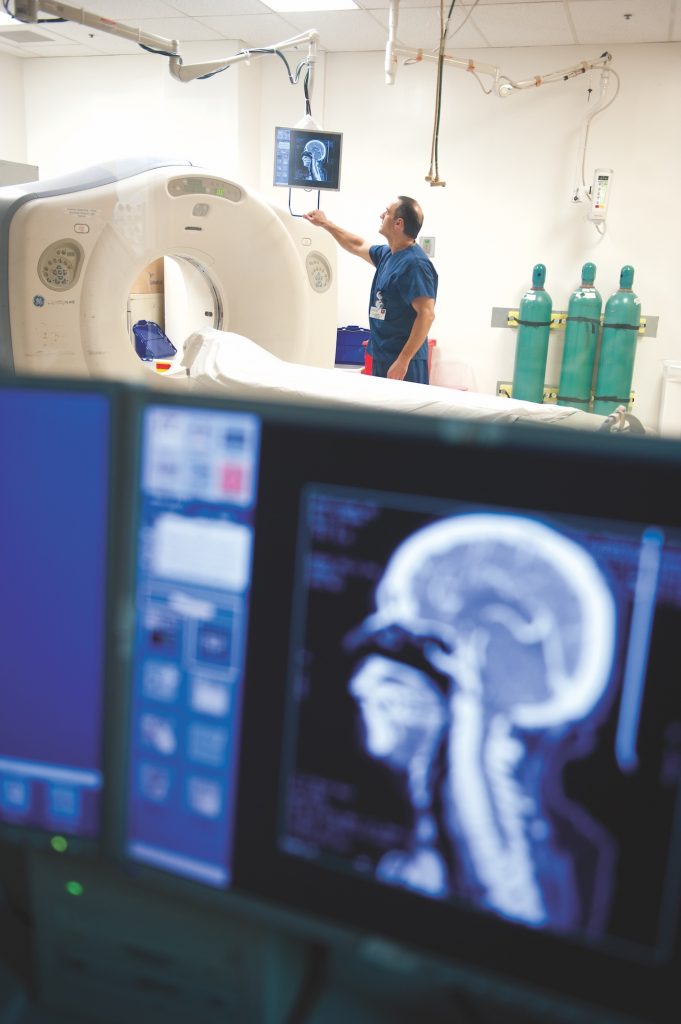Progress in the Fight Against Alzheimer’s

The University of Southern California’s Alzheimer’s Therapeutic Research Institute (ATRI) is using research and analysis to slow the ever-growing Alzheimer’s disease epidemic. “The mission of ATRI is to accelerate the development of effective treatments and preventive measures against Alzheimer’s,” says Paul Aisen, MD, a professor of neurology at USC and founding director of the ATRI. “We now have all the tools we need: promising therapeutics, accurate diagnostics, and sensitive indicators of disease progression. Success is within reach, and investment in our prevention studies can bring major dividends for public health.”
“It’s a one-of-a-kind institute,” says ATRI Program Manager Shelley Moore. “Our team has been doing research for 30 years, so we have been developing the infrastructure of Alzheimer’s research for a long time. Now, we are moving into primary prevention of the disease by creating better trials for better treatments.”
With just one drug approved nationally by the Food and Drug Administration in the past 18 years, advancement in Alzheimer’s treatment has been slow. Anybody who has followed Alzheimer’s research knows there is no cure, and the treatments that exist are only modestly effective.
For years, the disease was primarily detected retroactively by discovering plaque buildup, tau tangles, and shrinkage of the brain, particularly the hippocampus where memories are stored, during autopsies. But the onset of Alzheimer’s can be found through a variety of biomarkers, positron emission tomography or PET scans, and now blood tests. What ATRI brings to the table is an approach based on early detection of signs of disease before memory loss symptoms even begin. Platforms are built around what we’ve learned: that amyloid plaques accumulate first, as many as 15 years before symptoms, then tau tangles accumulate as clinical memory issues become measurable.
“The use of biomarkers has changed the way we choose participants for our trials,” Aisen said during a recent World Alzheimer’s Day event. “Up until the development of these PET scans, every trial of a therapeutic treatment only selected participants based on a clinical diagnosis, which turns out to be wrong in 20 percent of the cases.”
“These trials are long, and we have to enroll a lot of participants,” he said. “But we are excited to be the first to see if we can make a difference before there is irreversible damage. We are looking for people who wouldn’t normally participate in an Alzheimer’s trial because they don’t have symptoms.”
If the work is successful, it will have laid the foundation for a treatment that can substantially slow the disease’s progression.
USC Alzheimer’s Therapeutic Research Institute
Donate now!keck.usc.edu/atri
(858) 616-7557
Program Administrator: Shelley Moore
Mission
The mission of the Alzheimer’s Therapeutic Research Institute’s (ATRI) is to rigorously test methods for early detection of and treatments for Alzheimer’s disease (AD). Led by Paul Aisen, MD, ATRI is comprised by a growing set of teams of highly skilled researchers with expertise in biostatistics, psychology, informatics, bench science, molecular neuroimaging, neuroscience and more.
Begin to Build a Relationship
We know you care about where your money goes and how it is used. Connect with this organization’s leadership in order to begin to build this important relationship. Your email will be sent directly to this organization’s Director of Development and/or Executive Director.
Making Alzheimer’s A Survivable Disease
Although there is still no cure for Alzheimer’s disease, the USC Keck School of Medicine’s Alzheimer’s Therapeutic Research Institute (ATRI) is working to make it a disease you can survive.
One project, the APT Webstudy, is for people who want to know their risks and participate in research. Aisen describes it as a way “to connect investigators with people who are at least 50 years of age, and therefore have entered the period of early risk for Alzheimer’s disease” and to track changes and report those changes back to people for discussion with their own clinicians. But it also allows us, the investigators, to analyze that data. And when we think someone is showing a change that indicates a risk, we can suggest that they come in for a blood biomarker test or an amyloid PET scan and we can definitively determine whether they have amyloid accumulation.
For those people who want to participate in clinical trials, they should find out whether they have amyloid. If they do, they can join trials of drugs that remove amyloid that are being conducted now. The APT Webstudy link is: www.aptwebstudy.org.
With enough funding, ATRI’s ongoing work, in validating early detection testing and treatments that target those early signs before symptoms occur, promises to revolutionize how the right people can be identified quickly and successfully treated.
To find out more about how to support Keck School of Medicine of USC’s ATRI and to donate, please visit www.keck.usc.edu/atri/support-us.
